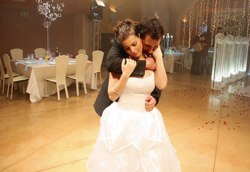On DVD: The Do-It-Yourself Yom Kippur Film Festival
It's that time of year again -- the time for atonement and repentance -- and pretty much the last thing you're supposed to do on Yom Kippur is watch movies. But we're not all hardcore traditional, nor are we all even Jewish, and a holiday is a holiday, dammit. Here's a few DVD-able ways to celebrate, if that's what you want to call it...
The Golem (1920)
The only German Expressionist classic - and the only "horror" genre tale - with its origins in ancient Judaic myth, this Paul Wegener production (he's the director and monolithic monster star) details the magical creation, in 16th century Prague, of a giant clay man to defend the Jews from persecution.
The Lost Weekend (1945)
Remember, Ray Milland's famous lush can't sell his typewriter for booze money because all of the Jewish-owned pawnshops are closed on Yom Kippur! Bad timing = rat-infested DT's.
The Ten Commandments (1956)
Over-the-top Bible epics don't come much funnier. Usually Passover is the time TV stations trot this dinosaur out, with its dizzying visions of Charlton Heston's chin, John Derek's pecs, Anne Baxter's pouty kitten lips, Yvonne DeCarlo's heaving cleavage, Edward G. Robinson growling, "Where's your messiah now?" But what the hell.
Enemies, a Love Story (1989)
By way of Isaac Bashevis Singer, this embraceable saga is set in the New York Jewish community in the late '40s, when traumatized refugees and camp survivors flooded into the city, and the Catskills were a haven. Singer's story is a doozy: One well-intentioned Polish Jew (Ron Silver), living in Coney Island married to the goy maid who hid him from the Nazis, maintains a passionate affair with a unstable fellow escapee (Lena Olin), who becomes pregnant. So he marries her, off the books -- and that's about when his other, first wife (Anjelica Huston), whom he had thought perished in the camps, shows up, leaving him with three wives and no sensible plan of action. Paul Mazursky directed, and it's the finest, most deeply felt movie that vet of the '70s ever made.
The Life and Times of Hank Greenberg (1999)
A strapping, good-natured, Bronx-born lad of 6'4", Greenberg was the first Jew to play major league ball, and was also one of the game's best hitters, becoming a local Detroit monument and a national symbol for Jews all over the country. In this doc, interviewee Walter Matthau describes Greenberg as suggesting to his generation of Jewish boys the possibility of "not having to be a cutter or salesman in the garment business," while Alan Dershowitz entertained fantasies of Greenberg being the first Jewish President. The details are winning, including how the Tigers would lose crucial games on Yom Kippur because Greenberg wasn't playing.
Kippur (2000)
Israeli filmmaker Amos Gitai's launch at the Yom Kippur War, which is both breathtakingly scary and arresting, and brimming with ambivalence.
Easily the most peculiar of new Israeli films, this magical-realist seaside fairy tale ropes in the tales of three women: a heartbroken waitress confronted one day at the beach with a mute five-year-old girl who simply walked out of the sea; a newlywed stuck honeymooning in a Tel Aviv dump after she breaks her ankle during her reception; and a Filipino nursemaid far from home and commissioned to care for a belligerent old Jewish woman. Scenes often trail off like a dozing child, and dreaminess is a given, particularly once the waitress gets hit by a bus and walks the streets of the city in her hospital gown, still searching for the wide-eyed nymph in the bathing suit that disappeared when she wasn't looking.
Waltz with Bashir (2008)
Buckle up. This head-shaking Israeli fugue between social documentary and digital animated epic isn't quite like any other movie. Ari Folman's film comes at you like a lysergic drug that targets your optic nerves, from the opening sequence, when we blast along at ground level with a pack of ravenous, fanged dogs running through the Tel Aviv streets under a stormy yellow sky, drawn and animated with high-contrast, nightmarish surreality. It's a search for memory (supposedly Folman's, who animates himself) of the early-'80s invasion of Lebanon, and the famous massacre of refugees at Shabila. The movie is rambunctious rock 'n roll, but the tableaux -- entire landscapes scorched by bombings, a downed pilot's sea-lost hallucination of a giant naked woman, an international airport wrecked and abandoned after an aerial attack, a lingering stream of blood running from the back door of an armored vehicle -- are unforgettable.
Four Seasons Lodge (2008)
A poignant documentary portrait of a Jewish summer community in the Catskills (one of a few where once there'd been hundreds), peopled almost entirely by elderly concentration camp survivors. Filmmaker Andrew Jacobs folds in aging snapshots and listens to the grey lions' stories and ends up mourning not only the losses of the Nazi rampage but of the postwar communal era, fading away into a second history as time presses on.
A Serious Man (2009)
Joel and Ethan Coen's most personal film -- almost autobiographical in its details -- and the oddest, this half-comedy follows the Job-like descent into lucklessness of an early-'60s physics-prof (Michael Stuhlbarg), beginning with his irritable wife's command for a divorce and climaxing with a tornado, and how he addresses it in a series of rabbinical consultations, looking for The Answer to life's mysteries, at least to counterbalance the Uncertainty Principle he teaches in class. As usual the Coens nail down the day and age (right to the aluminum "G" in the Gopniks' front screen door), and there's even a Yiddish pre-credit sequence set in a Sholom Aleichem-era shtetl, in which a couple face off against a dybbuk, suggesting the modern quandaries to come.

